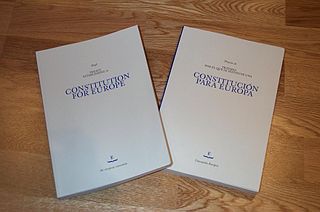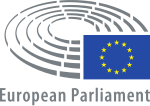Related Research Articles

The European Coal and Steel Community (ECSC) was a European organization created after World War II to integrate Europe's coal and steel industries into a single common market based on the principle of supranationalism. It was formally established in 1951 by the Treaty of Paris, signed by Belgium, France, Italy, Luxembourg, the Netherlands, and West Germany. The organization's subsequent enlargement of both members and duties ultimately led to the creation of the European Union.

The European Economic Community (EEC) was a regional organisation created by the Treaty of Rome of 1957, aiming to foster economic integration among its member states. It was subsequently renamed the European Community (EC) upon becoming integrated into the first pillar of the newly formed European Union in 1993. In the popular language, however, the singular European Community was sometimes inaccurately used in the wider sense of the plural European Communities, in spite of the latter designation covering all the three constituent entities of the first pillar.

The European Communities Act 1972, also known as the ECA 1972, was an Act of the Parliament of the United Kingdom which made legal provision for the accession of the United Kingdom to the three European Communities – the European Economic Community, European Atomic Energy Community (Euratom), and the European Coal and Steel Community ; the EEC and ECSC subsequently became the European Union. The Act also incorporated Community Law into the domestic law of the United Kingdom and its acquis communautaire, its treaties, regulations and directives, together with judgments of the European Court of Justice, and the Community Customs Union, the Common Agricultural Policy (CAP) and the Common Fisheries Policy (FCP).

The Treaty establishing a Constitution for Europe was an unratified international treaty intended to create a consolidated constitution for the European Union (EU). It would have replaced the existing European Union treaties with a single text, given legal force to the Charter of Fundamental Rights, and expanded qualified majority voting into policy areas which had previously been decided by unanimity among member states.

The European Union (EU) has expanded a number of times throughout its history by way of the accession of new member states to the Union. To join the EU, a state needs to fulfil economic and political conditions called the Copenhagen criteria, which require a stable democratic government that respects the rule of law, and its corresponding freedoms and institutions. According to the Maastricht Treaty, each current member state and the European Parliament must agree to any enlargement. The process of enlargement is sometimes referred to as European integration. This term is also used to refer to the intensification of co-operation between EU member states as national governments allow for the gradual harmonisation of national laws.

The president of the European Council is the person presiding over and driving forward the work of the European Council on the world stage. This institution comprises the college of heads of state or government of EU member states as well as the president of the European Commission, and provides political direction to the European Union (EU).
A supranational union is a type of international organization that is empowered to directly exercise some of the powers and functions otherwise reserved to states. A supranational organization involves a greater transfer of or limitation of state sovereignty than other kinds of international organizations.

This is a list of referendums related to the European Union, or referendums related to the European Communities, which were predecessors of the European Union. Since 1972, a total of 48 referendums have been held by EU member states, candidate states, and their territories, with several additional referendums held in countries outside the EU. The referendums have been held most commonly on the subject of whether to become a member of European Union as part of the accession process, although the EU does not require any candidate country to hold a referendum to approve membership or as part of treaty ratification. Other EU-related referendums have been held on the adoption of the euro and on participation in other EU-related policies.

The apportionment of seats within the European Parliament to each member state of the European Union is set out by the EU treaties. According to European Union treaties, the distribution of seats is "degressively proportional" to the population of the member states, with negotiations and agreements between member states playing a role. Thus the allocation of seats is not strictly proportional to the size of a state's population, nor does it reflect any other automatically triggered or fixed mathematical formula. The process can be compared to the composition of the electoral college used to elect the President of the United States of America in that, pro rata, the smaller state received more places in the electoral college than the more populous states.

The Treaty of Accession 2005 is an agreement between the member states of European Union and Bulgaria and Romania. It entered into force on 1 January 2007. The Treaty arranged accession of Bulgaria and Romania to the EU and amended earlier Treaties of the European Union. As such it is an integral part of the constitutional basis of the European Union.

Altiero Spinelli was an Italian politician, political theorist and European federalist, referred to as one of the founding fathers of the European Union. A communist and militant anti-fascist in his youth, Spinelli spent 10 years imprisoned by the Italian fascist regime. Having grown disillusioned with Stalinism, he broke with the Communist Party of Italy in 1937. Interned in Ventotene during World War II, he, along with fellow democratic socialists, drafted the manifesto For a Free and United Europe in 1941, considered a precursor of the European integration process.

The Conference of Parliamentary Committees for Union Affairs of Parliaments of the European Union (COSAC) is a conference of Members of the European Parliament (MEPs) and national Members of Parliament (MPs) who are drawn from parliamentary committees responsible for European Union affairs.

Withdrawal from the European Union is the legal and political process whereby an EU member state ceases to be a member of the Union. Article 50 of the Treaty on European Union (TEU) states that "Any Member State may decide to withdraw from the Union in accordance with its own constitutional requirements".

The European Union (EU) is a political and economic union of 27 member states that are party to the EU's founding treaties, and thereby subject to the privileges and obligations of membership. They have agreed by the treaties to share their own sovereignty through the institutions of the European Union in certain aspects of government. State governments must agree unanimously in the Council for the union to adopt some policies; for others, collective decisions are made by qualified majority voting. These obligations and sharing of sovereignty within the EU make it unique among international organisations, as it has established its own legal order which by the provisions of the founding treaties is both legally binding and supreme on all the member states. A founding principle of the union is subsidiarity, meaning that decisions are taken collectively if and only if they cannot realistically be taken individually.

The year 1948 marked the beginning of the institutionalised modern European integration. With the start of the Cold War, the Treaty of Brussels was signed in 1948 establishing the Western Union (WU) as the first organisation. In the same year, the International Authority for the Ruhr and the Organization for European Economic Co-operation, the predecessor of the OECD, were also founded, followed in 1949 by the Council of Europe, and in 1951 by the European Coal and Steel Community, with the ensuing moves to create further communities leading to the Treaty of Rome (1957).
European Union (EU) concepts, acronyms, and jargon are a terminology set that has developed as a form of shorthand, to quickly express a (formal) EU process, an (informal) institutional working practice, or an EU body, function or decision, and which is commonly understood among EU officials or external people who regularly deal with EU institutions.

The national parliaments of the European Union are those legislatures responsible for each member state of the European Union (EU). They have a certain degree of institutionalised influence which was expanded under the Treaty of Lisbon to include greater ability to scrutinise proposed European Union law.

The Treaty of Lisbon is an international agreement that amends the two treaties which form the constitutional basis of the European Union (EU). The Treaty of Lisbon, which was signed by all EU member states on 13 December 2007, entered into force on 1 December 2009. It amends the Maastricht Treaty (1992), known in updated form as the Treaty on European Union (2007) or TEU, as well as the Treaty of Rome (1957), known in updated form as the Treaty on the Functioning of the European Union (2007) or TFEU. It also amends the attached treaty protocols as well as the Treaty establishing the European Atomic Energy Community (EURATOM).

The Treaty of Accession 2011 is an agreement between the member states of the European Union and Croatia concerning Croatia's accession to the EU. It was signed on 9 December 2011 in Brussels by the heads of state or government of the 27 member states and by the president of Croatia, Ivo Josipović, and Prime Minister Jadranka Kosor.

The European Union (Withdrawal) Act 2018 is an Act of the Parliament of the United Kingdom that provides both for repeal of the European Communities Act 1972, and for parliamentary approval to be required for any withdrawal agreement negotiated between the Government of the United Kingdom and the European Union. The bill's passage through both Houses of Parliament was completed on 20 June 2018 and it became law by Royal Assent on 26 June.
References
- European Parliament Fact Sheets 1.3.5. The European Parliament: relations with the national parliaments
- Klepsch, Egon A. 2007 (1992). "The Democratic Dimension of European Integration". Government and Opposition 27 (4): pp. 407–413.
- http://oldsite.federalunion.org.uk/europe/assizes.shtml Archived 2017-08-23 at the Wayback Machine
